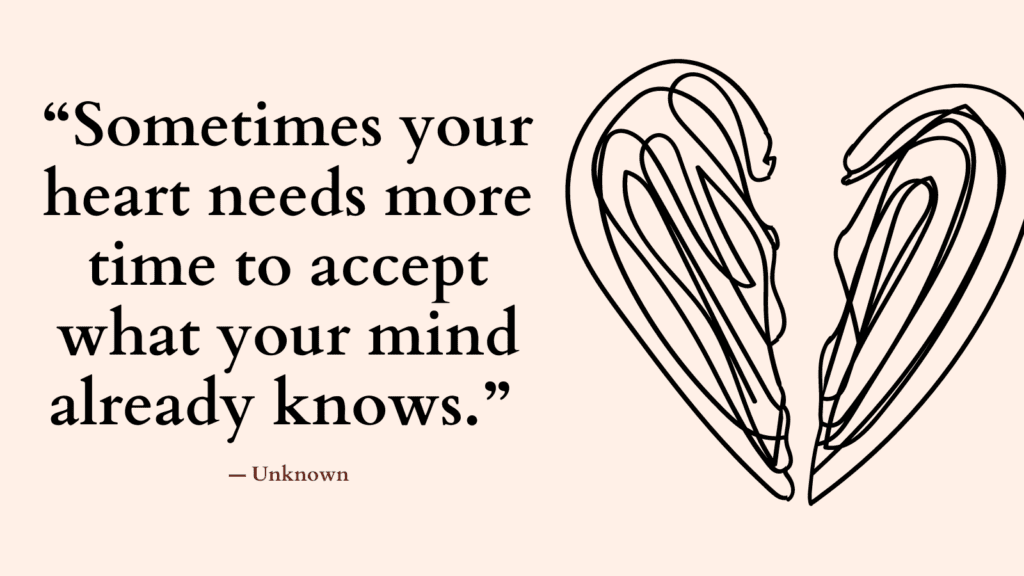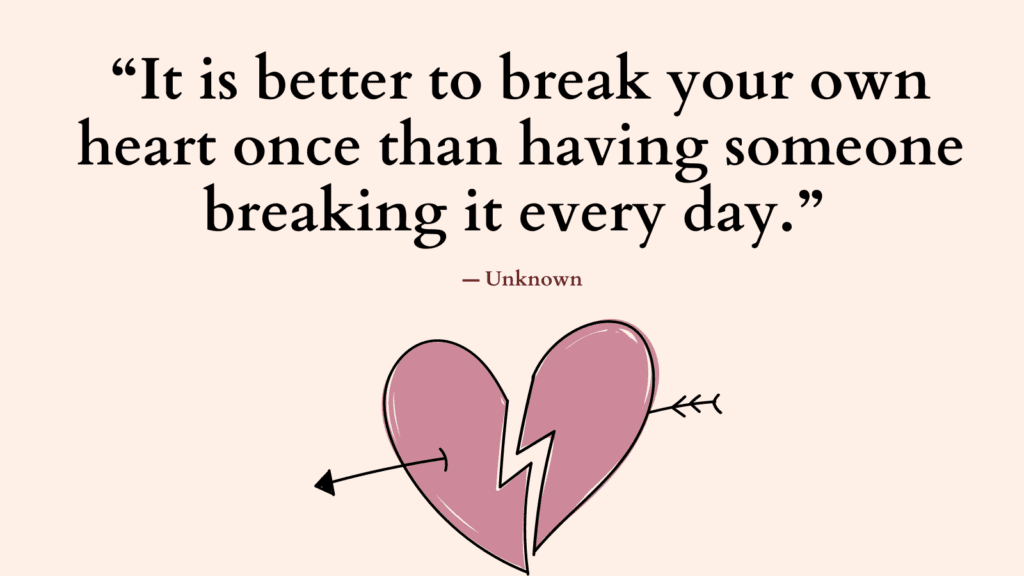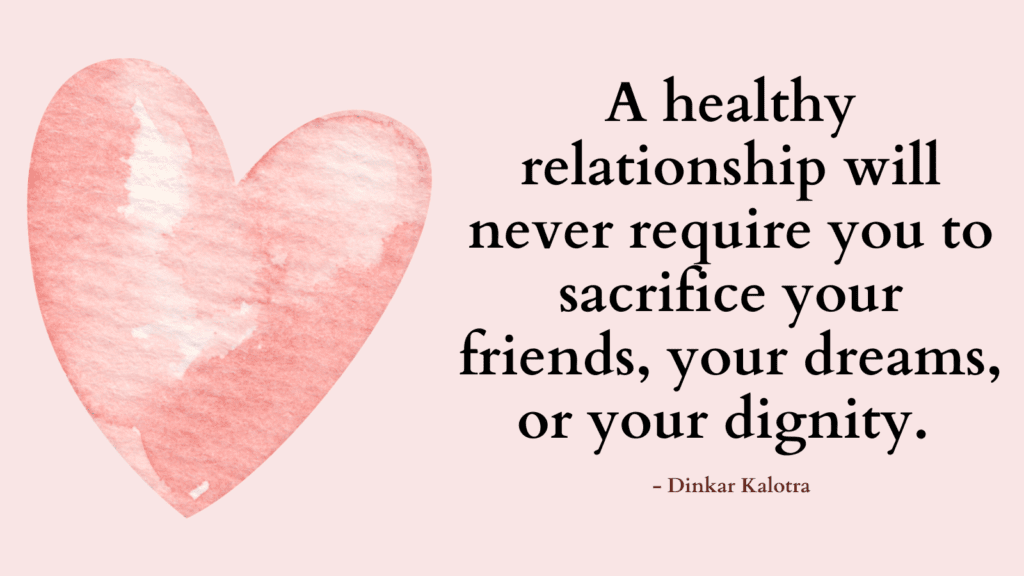This post contains breakup journal prompts to help you deal with a breakup without closure.
Breakup Journal Prompts
Why Use Journaling Prompts For Breakup Recovery?
Journaling helps get your thoughts and feelings outside of your system and onto paper.
This helps you take a step back from your internal experience, reduce the intensity of your painful emotions, and bring more clarity.
Checking-in
1. How do you feel right now? Where do you feel it in your body? Is it better or worse than yesterday?
2. What can you do to soothe yourself today?
Related: How To Feel Your Feelings & Sit With Painful Emotions? (Top 9 Difficult Emotions)
3. What do you need right now? How can you show up for yourself more?
Self-Care Worksheets
4. How can you distance yourself – physically and mentally – from your ex while you heal?
5. What things do you miss from the relationship (e.g. your ex’s company)? How can you replace the things you miss (e.g. meeting with friends more)?
6. What would your ideal day look like? When would you wake up? What would your ideal morning routine be? What activities would fill your day? What can you do to get closer to your ideal day?
Reflecting on The Relationship
7. How do you feel about this breakup?
8. What emotions does thinking of your ex trigger? Why is this?
9. What thoughts does thinking of your ex trigger?
Related: Best 17 Tips On How To Cope With Divorce When You Still Love Him
10. What do you miss about your ex? What don’t you miss about your ex?
11. When did you realize that the relationship isn’t working?
12. Did you stay longer in the relationship than you should have? If so, why is that?
13. What do you think caused the relationship to end?
14. Were you and your ex compatible? OR were you trying to force things to work?
15. What part did you play in this relationship ending? What would you have done better?
16. Did you have communication issues within your relationship?
17. What did you dislike about the relationship?
18. What was lacking in the relationships? What needs of yours were unfulfilled?
19. What did you notice about yourself while in the relationship? Were you able to be yourself in the relationship?
20. How did the relationship limit your life? What Will be better about life now that you’re no longer in that relationship?
21. Write a list of all the times they let you down or hurt you.
22. What did you learn from the relationship? How can you grow from this breakup?
23. What do you know you have to do to move on from this relationship?
24. What’s one thing about yourself, you know you need to work on?
25. What’s something you know you need to forgive yourself for?
26. What limiting beliefs do you have coming out of this relationship? How can you challenge them?
Negative Core Beliefs List
Related: Negative Core Beliefs List (& 8 Tips On How To Challenge Them)
27. Would it be healthy to get back together with your ex? Why or Why not?
28. How do you feel about moving on?
29. How did you handle breakups in the past? What helped you move on?
30. Write your ex a letter expressing everything that was left unsaid. Rip it up afterward or burn it.
Boosting Your Mood
31. What is one thing that instantly makes you feel safe and calm?
32. How can you comfort yourself and show yourself some love?
33. If a dear friend was in the same position, what would you tell them to comfort them?
34. Write about a challenge that you overcame recently that made you feel strong and proud.
35. What are three great things about being single?
36. How can you start ‘dating yourself’?
Related: Top 45 Self Care Day Ideas at Home To Kickstart Your Self Care Ritual
37. Who are you without the relationship? How would you describe yourself? What hobbies or activities bring you joy?
38. What are 3 goals that you always wanted to work on?
39. What important non-romantic relationships in your life do you have right now?
40. Write a letter to yourself in a year sharing where you hope to be in life.
41. What things are equally or more important than a romantic partner?
42. Study after study shows that gratitude is strongly and consistently associated with greater happiness. What are grateful for most at the moment? How can you make it a habit to express gratitude every day?
Gratitude Journaling Prompts
Related: How To Practice Gratitude When Depressed? (10 Practical Gratitude Exercises)
43. Write down three positive affirmations to help you move on.
The following are some examples:
- Even if my heart hurts, I’m worthy of love.
- My wellbeing is my number one priority.
- This pain is only temporary.
- It’s okay to feel this.
- It is perfectly normal to feel these things after a breakup.
- I choose to let go of my past regrets and resentments.
44. Write about your dream partner. What traits and qualities do you want in them?
45. How can you actively prepare to be in a relationship? Do you need to allow yourself to be more vulnerable and emotionally available? Are you equipped to see the red flags in others?
FREE Breakup Worksheets PDF
How to Heal After a Breakup?
Healing after a breakup can be a challenging process, as it often involves a range of emotions such as sadness, anger, and loss.
Here are some scientifically supported suggestions to aid in your healing:
1. Allow yourself to grieve
It’s essential to acknowledge and express your emotions regarding the breakup.
Give yourself permission to feel sad, angry, or disappointed.
Suppressing these emotions may prolong the healing process.
2. Practice self-care
Prioritize taking care of yourself physically, emotionally, and mentally.
Engage in activities that bring you joy and relaxation, such as exercise, healthy eating, spending time with loved ones, and pursuing hobbies.
Related: Best 22 Self Care Products On Amazon
3. Build a support network
Surround yourself with supportive friends and family who can offer understanding, empathy, and encouragement during this challenging time.
Sharing your thoughts and feelings with others can provide comfort and help you gain perspective.
4. Set boundaries
Establish clear boundaries with your ex-partner to allow yourself space and time to heal.
This may include limiting contact, unfollowing them on social media, or temporarily avoiding places you used to frequent together.
5. Reflect and learn
Take time to reflect on the relationship and the breakup.
Identify any patterns, lessons, or personal growth opportunities that may have arisen from the experience.
However, be careful not to dwell excessively on the past.
Related: Top 25 Self Reflection Journal Prompts
6. Focus on personal growth
Use this period as an opportunity for self-discovery and growth.
Set new goals, explore new interests or hobbies, and invest time in activities that contribute to your personal development and well-being.
Remember, healing takes time, and everyone’s journey is different.
Be patient with yourself and trust that with time, self-care, and support, you will gradually heal and move forward in a positive way.
Conclusion
The intensity of your pain might frighten you, but remind yourself that it’s normal. You are grieving.
But the pain won’t last forever. You will not always feel this way.
For now, take it a day at a time, an hour at a time, and take care of yourself. Reassure yourself that you’ll heal eventually and move on.

FAQ
When will I know that I’m emotionally ready to move on?
It is important to spend some time alone to heal your heart, but also reflect on the relationship and what could you learn and use in the future.
While there is no specific period of time you should wait before you are ready to move on, a good sign would be when you feel eager for a new relationship but not desperate or frightened and when you have gotten past much of your anger and are able to wish your ex well.
Is it normal to feel a mix of emotions after a breakup?
Absolutely! It is entirely normal to experience a range of emotions after a breakup, including sadness, anger, confusion, and even relief.
Emotions can vary from person to person and may fluctuate over time.
Everyone copes differently, so remember that your feelings are valid.
Should I stay friends with my ex-partner?
Deciding whether or not to maintain a friendship with an ex-partner depends on your specific circumstances.
In some cases, remaining friends can work, especially if there is mutual respect and a genuine desire to continue the connection.
However, it is crucial to prioritize your well-being and assess whether remaining friends would hinder your healing process or lead to further emotional distress.
When should I consider seeking professional help?
If you find that your emotions are overpowering, affecting your daily functioning, or persisting for an extended period, it may be beneficial to seek professional support.
A mental health professional can assist in processing your emotions, developing coping strategies, and providing guidance tailored to your specific needs.
References
Portions of this article were adapted from the book Getting Past Your Breakup, © May 2009 by Susan J. Elliott. All rights reserved.
- Romantic relationship breakup: An experimental model to study effects of stress on depression (-like) symptoms | PLOS ONE
- Breaking Up is Hard to do: The Impact of Unmarried Relationship Dissolution on Mental Health and Life Satisfaction – PMC (nih.gov)
- (PDF) The Love -Breakup study: Defining love and exploring reasons for the breakup of romantic relationships (researchgate.net)
- Breakups aren’t all bad: Coping strategies to promote positive outcomes (apa.org)
- How To Get Over a Breakup, According to Science | Time
- How Long Does It Take to Get Over a Breakup? (healthline.com)
- The Psychology of Why Some People Take Breakups Harder Than Others – The Atlantic
- Breaking Up Is Hard To Do, But Science Can Help : Shots – Health News : NPR



